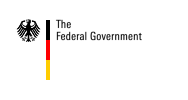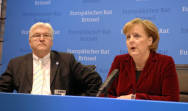She made one thing clear, however. Countries that want to join will have to satisfy the criteria. In reference to Serbia she mentioned the need to cooperate with the International War Crimes Tribunal in The Hague, noting that every candidate country has the prospects it earns for itself. She added that a general prospect of accession has been confirmed for the western Balkan states.
The discussion of enlargement by the EU leaders in Brussels was based on a strategy paper published by the European Commission on November 8 in which a critical look is taken at the European Union's capacity for further enlargement in view of the institutional and financial consequences this would have.
Merkel observed that the effects of past enlargements have been extremely positive, noting that 2.5 million jobs have been created since the creation of the single market in 1993 and that Germany, for one, has profited greatly from the admission of ten new members in May 2004.
Attempt to revitalize constitutional process
Future enlargements will make it necessary for the European Union to carry out institutional reforms in order to remain governable. This once again raises the issue of a European constitutional treaty.
Finnish Council President Matti Vanhanen briefed the member states on the talks held on this matter over the past six months. Chancellor Merkel reaffirmed that Germany continues to want to preserve the core elements of the constitutional treaty.
She said her presidency would present a road map in June showing how the constitutional process can be continued and that consultations with representatives of the member states will be held in the months leading up to that.
Regulation of legal immigration
In consultations on immigration policy attention was directed to inflows of economic refugees from Africa as well as from neighboring countries on the EU's eastern borders. Talking points included the effectiveness of rapid border intervention teams and issues such as the efficiency of Frontex, the EU's border management cooperation agency, with criticism being expressed of data registration procedures.
"We need to continue to strengthen Frontex and its ability to work," Merkel noted. Foreign Minister Frank-Walter Steinmeier indicated that Germany is contributing to this effort, among other things by supplying equipment.
Response to Cyprus conflict
The European Council also assessed the progress being made in accession negotiations with Turkey. At the beginning of the week the European foreign ministers agreed on a common approach with regard to Turkey. Eight out of the thirty-five chapters being negotiated have been suspended for the time being.
These eight chapters all have to do with obligations deriving from the Ankara Protocol under which Turkey is required to open up its seaports and airports for Cypriot ships and planes.
The European Commission will report annually on the progress being made in the membership talks. On that basis the EU member states will decide on further steps to be taken.
Next enlargement nearing completion
The heads of state and government welcomed Romania and Bulgaria as new members. The accession of these two countries on January 1, 2007 marks the completion of the fifth enlargement of the European Union.

